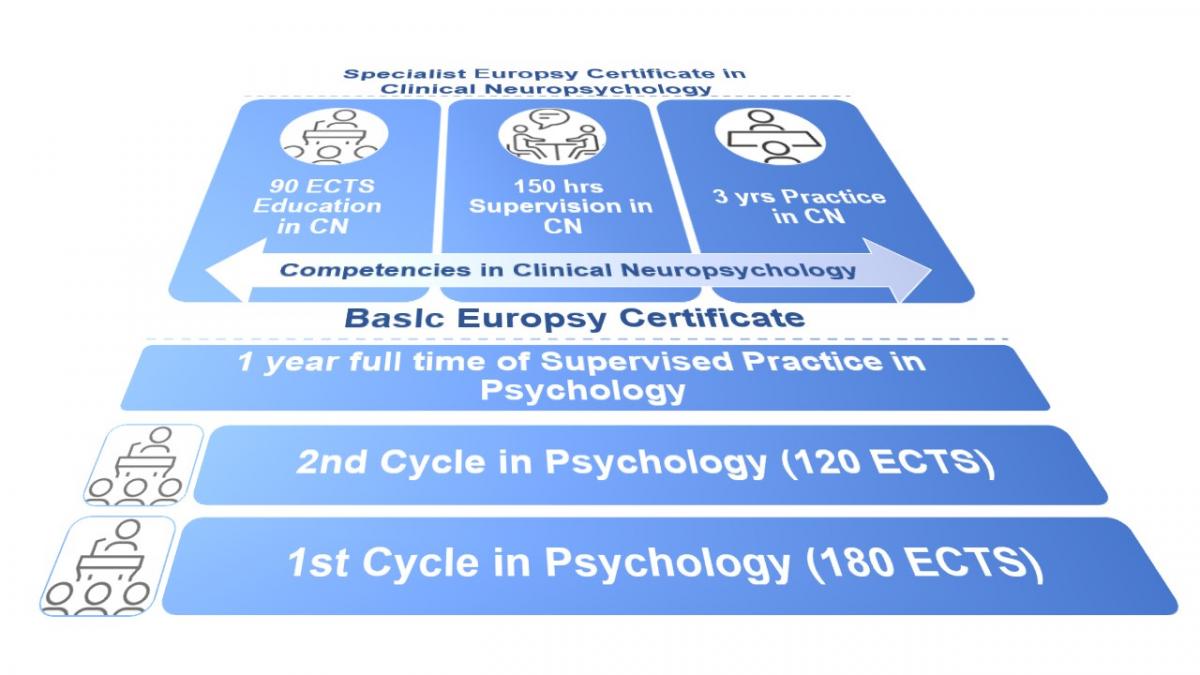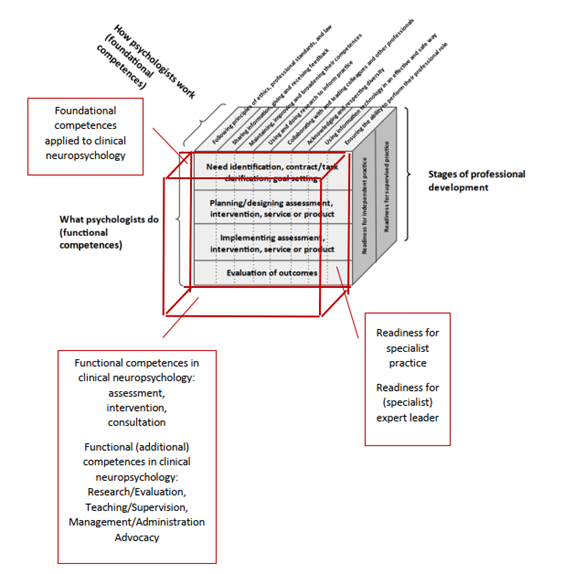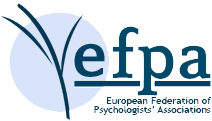Specialist certificate in Clinical Neuropsychology
Provisional Specialist Certificate in Clinical Neuropsychology
The Provisional EuroPsy Specialist Certificate
in Clinical Neuropsychology follows the general framework of the EuroPsy Specialist Certificates in Work & Organizational Psychology, in Psychotherapy, and in Sports Psychology (EFPA, 2023). The regular route to the certificate is depicted in Figure 1 and described in more detail below (Section I).
Study load is expressed in terms of ECTS-units (ECTS = European Credit Transfer System) but this does not mean that education and training is expected to take place within university programmes only. The training models, exact content and curriculum of the learning activities may differ from country to country.
Learning domains and the accumulating competencies (knowledge and skills) required for independent practice in Clinical Neuropsychology are described in Section III and the Appendix. Applicants who wish to obtain the Provisional EuroPsy Specialist Certificate in Clinical Neuropsychology under Article 38 of the EuroPsy Regulations (the transitional route) will have criteria detailed separately (Section II).

Figure 1. The regular route to Specialist Certificate in Clinical Neuropsychology
Section I The cumulative requirements in the regular route
- The applicant needs to have met the basic EuroPsy requirements, as described in the EuroPsy regulations (EFPA, 2023).
Anyone applying for the specialist certificate needs to hold a Basic EuroPsy Certificate or be eligible for it (they are first assessed for the Basic Certificate and once approved, for the Specialist Certificate).
- The applicant needs to have completed at least 90 ECTS of post-graduate (=post-basic-EuroPsy) education in Clinical Neuropsychology.
Learning takes place in wide variety of environments. Formal, informal, and non-formal learning achievements are recognised as part of the education (EHEA, 2015). This means that the education and learning of the Clinical Neuropsychologist in training (CNP- trainee) can take place not only within universities and other teaching institutions (formal) but also in other organized ways (non-formal) or within e.g. work practices (informal). Regardless of where it takes place, the training should ensure the accumulation of the required competencies described in the Appendix.
Of the 90 ECTS, a minimum of 60 ECTS should be post-graduate (=post-basic-EuroPsy) theoretical and/or professional courses and a maximum of 30 ECTS can be applied projects in research, assessment, or intervention submitted for evaluation in form of a logbook, portfolio, report papers or similar. The courses should either be in a form of a programme with a pre-planned curriculum or otherwise generate a comprehensive selection of training courses involving CNP-trainee evaluation. The training model should be accredited by the national EFPA member association or another national authority.
Learning achievements that have not been evaluated using ECTS can be allocated ECTS by assessing the workload involved. Within the EHEA and the EuroPsy system, 1 ECTS equals 25-30 hours of CNP-trainee study load and 60 ECTS equals 1500-1800 hours, which is 1 year of full-time study (EHEA, 2015). Therefore, 90 ECTS equals either 1,5 years of full-time study or 3 years of part time (50 %) study.
Within the EHEA, about 1/3 of the required hours in each course-related ECTS should typically be lectures or classes and 2/3 should be independent work (reading the required literature, writing essays, completing other assignments, etc.).Studies completed within the basic EuroPsy training (e.g. during the bachelor or master’s degree programme used for the basic certificate) cannot be counted towards the specialist certificate.
- The applicant needs to have completed at least 3 years of post-graduate (=post-basic EuroPsy) supervised practice in Clinical Neuropsychology.
The 3 years should be full time (or equivalent) work in Clinical Neuropsychology, involving work face-to-face with patients/clients. Full time work typically includes 1500-1800 hours of work per year. The clinical work should be concurrently running and overlapping with the theoretical training or starting immediately (within 1 year) after the theoretical training ends.
The supervised practice should ensure the accumulation of the required competencies described in the Appendix.
- The applicant needs to have acquired at least 150 hours of post-graduate (=post-basic EuroPsy) supervision in Clinical Neuropsychology
The supervision can take place one-on-one and/or in small groups. The supervisor can be from the same institution or outside the institution where the CNP-trainee works. The supervision should ensure the accumulation of the required competencies described in the Appendix.
The supervisor must have the competences outlined in the EuroPsy regulations, Appendix V, and applied to Clinical Neuropsychology. This means the supervisor must be a qualified, licensed psychologist, and have a history of at least 2 years of independent practice as a specialist* in Clinical Neuropsychology, with training or experience in giving supervision. In countries where supervision is well established, the standards can be higher. The supervisor needs to be recognised by the S-NAC.
* During the pilot phase, definition of a specialist is based on the existing professional standards in the country of practice at the time of practice.
Section II The cumulative requirements in the transitional route
- The applicant needs to be entitled to work as a psychologist following national legal or professional regulations of the country where they apply.
- The applicant needs to have met the basic EuroPsy requirements, as described in the EuroPsy regulations (EFPA, 2023).
Anyone applying for the specialist certificate needs to hold a Basic EuroPsy Certificate or be eligible for it (they are first assessed for the Basic Certificate and once approved, for the Specialist Certificate). - The applicant needs to provide evidence of competencies gained during a period of at least 5 full time years within the last 10 years of independent practice as a Clinical Neuropsychologist.
- While practicing, the applicant needs to have completed all the education and training typically required by the professional standards of the country where they apply.
The applicant needs to provide evidence of the required theoretical and professional training.
Section III Competencies expected from a Clinical Neuropsychologist
The objective of the specialist education and training is to ensure that the competencies needed for independent practice in Clinical Neuropsychology are achieved. The competencies accumulate in the different learning activities, theoretical courses, supervision and practice, and they build upon the competences expected from those having been qualified for the basic EuroPsy. CNP-trainees and training entities share the responsibility for ensuring that individuals acquire these competencies across the levels of training.
The EuroPsy regulations (2023) identify (a) Functional competences describing various types of psychological activity and the psychological knowledge, skills, and attitudes required in each of the activities; and (b) Foundational competences describing the knowledge, skills, and attitudes needed in all the activities. In the specialist competency framework, foundational and functional competencies are expanded and described within the context of Clinical Neuropsychology. Figure 2 shows the overlay of basic and specialist competency building.
The competence elements presented in Tables 1-5 in the Appendix are indicated either as ‘mandatory’ or ‘recommended’. The specialist education and training should ensure that those labelled as ‘mandatory’ are achieved in full. The competence must be such that the Clinical Neuropsychologist can be expected to perform each of the core domains in an adequate manner and independently. Different programmes or training systems may have different emphasis and ECTS load, and a selection of those labelled as ‘recommended’ can be added accordingly. A maximum of 25% of the training should focus on the ‘recommended’ items, which means that at least 75% of the training should target the ‘mandatory’ ones.
Foundational competencies in the Appendix Table 1 are unique to Clinical Neuropsychology but common across the different functional domains. Functional competences in the Appendix Tables 2-5 pertain to seven specific domains of practice. At the core of Clinical Neuropsychology are the Functional Competency domains of Assessment, Intervention, and Consultation. Additional Functional Competency domains relevant to Clinical Neuropsychology include Research/Evaluation, Teaching/Supervision, Management/Administration, and Advocacy. Of note, few competences of these latter are considered mandatory. Not all domains are equally important at the entry to independent specialist practice but may become focal later on. For example, teaching or management may become more relevant when the Clinical Neuropsychologist obtains a more advanced leader role. The competency elements presented here originate from the US framework (Rey-Casserly et al., 2012) which has been shown to be applicable to Clinical Neuropsychology internationally (Hessen et al., 2018; Kosmidis et al., 2022).

Figure 2. The revised EuroPsy competence framework for the basic level and the advanced level in Clinical Neuropsychology. Modified from the cube model describing the basic EuroPsy competencies (EFPA, 2023).
Appendix Tables 1-5
References:
EFPA (2023) EuroPsy – the European certificate in psychology. EFPA regulations on EuroPsy and appendices. https://www.europsy.eu/_webdata/europsy_regulations_july_2023_ga_brighton.pdf
EHEA European Higher Education Area (2015) ECTS User guide. http://egracons.eu/sites/default/files/ects-users-guide_en.pdf
Hessen, E., et al. (2018). Core competencies in clinical neuropsychology training across the world. Clin. Neuropsychol. 32, 642–656. doi: 10.1080/13854046.2017.1413210
Kosmidis, M.H., et al. (2022) Core Competencies in Clinical Neuropsychology as a Training Model in Europe. Front. Psychol. 13:849151. doi: 10.3389/fpsyg.2022.849151
Rey–Casserly, C., Roper, B. L., & Bauer, R. M. (2012). Application of a Competency Model to Clinical Neuropsychology. Professional Psychology: Research and Practice, 43, 422–431. doi: 10.1037/a0028721

